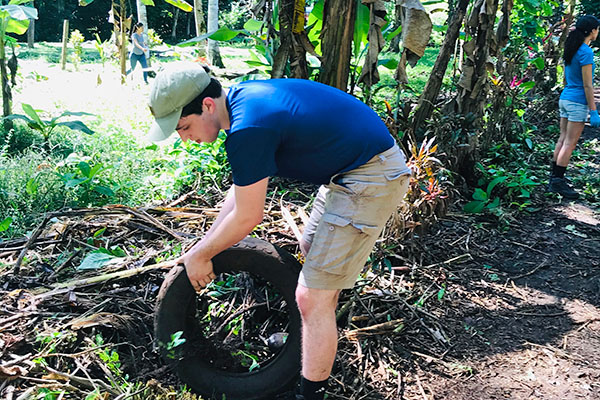Global Sustainability
Bachelor of Arts
Develop the skills to fully understand and plan action on environmental issues.
In this uncommon interdisciplinary program, you’ll benefit from faculty expertise in the humanities and environmental science — including natural sciences, sociology, political science, legal studies, economics, religious studies, and public health. Examine in depth issues such as food security, water quality, energy needs, and resource allocation across cultures. Choose electives to concentrate in a discipline of your interest. Apply your learning during short-term or semester-long experiences such as sustainability in Costa Rica or climate change in Canada.

Highlights
Gain a holistic understanding of global sustainability concerns
Benefit from study away/abroad options from 1–4 weeks or semester-long
Discuss and debate different perspectives on current issues
Develop a feasible action plan to address a current sustainability issue



Career Paths
- Sustainability manager
- Environmental scientist
- Logistics
- Recycling coordinator
- Director of corporate responsibility
Internships and Field Experiences
- Costa Rica Institute for Central American Development Studies (ICADS) — spring break, summer, or full semester
- Sioux YMCA in South Dakota
- Sustainable farming in Cambodia
- Wildlife and nature conservation in South Africa and Eswatini
Study Abroad
- Semester-long trip to Costa Rica to examine environmental sustainability
- Winter break trip to Texas to assist in disaster relief
- Spring break trip to Ecuador to look at food sustainability
- Summer trip to Canada to study glaciers and climate change
99%
of new Nazareth grads are employed or in grad school within six months of graduation
900
square-foot general biology lab
Top 20
ranked science labs in the nation by The Princeton Review
Sample Courses
- Environmental Humanities connects new developments in the field of ecocriticism and global environmental studies.
- Natural Disasters in American Society examines extreme events to reveal the inner dynamics of American society and its political system and public policies.
- Environmental Law examines environmental policy and laws about topics such as air and water quality, control of toxic substances, waste management and hazardous releases, protection of natural resources, U.S. energy policy, and international environmental law.
- Epidemiology
- Sustainable Development & Society
Program Director

Student Spotlight
Meghan Giessler '26, who's considering working in conservation or politics.
"Once I understood our planet was in danger, that led me to want to go into the sustainability field, to mitigate the effects of climate change. Nazareth’s global sustainability program is one of the main reasons I transferred here. Not a lot of colleges and universities I looked at had a program that was interdisciplinary. It was either more humanities focused or it was just environmental science. I liked how it combines the humanities and environmental science. So far, I love the program. I love all of the classes that we take. Global sustainability is so broad, and the classes that are in the major reflect that."
Her blog post: How You Can Mitigate the Effects of Climate Change in Your Own Front Yard